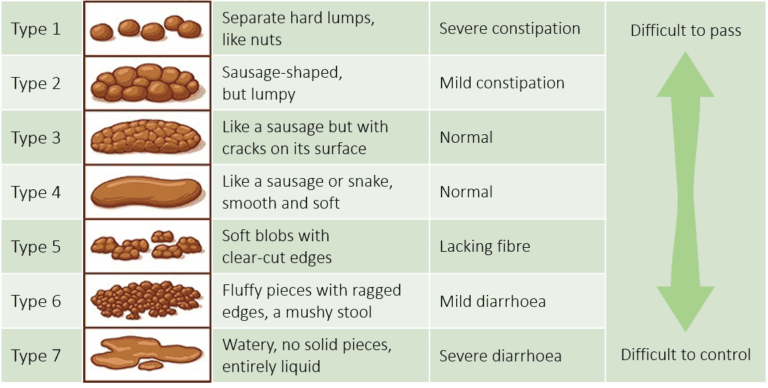Page Contents
Sometimes, when you see your neighbour discarding carton boxes at garbage bin, you may curiously take a glimpse if they have recently bought new appliances, or ordered something online. Garbage that you throw can be a good indicator of your household consumption.
Similarly, through observing your stool, you can make an educated guess of what you have eaten, your digestive health and potential illnesses.
How is stool related to your health?
When you eat, you chew foods into smaller size and swallow down to your stomach through the esophagus. In the stomach, gastric acid breaks down the foods. After that, bile helps to neutralise the acid and emulsify the fats. In the small intestine, nutrients of the digested foods are absorbed into your body. When digested foods reach the large intestine, water is absorbed and thus formation of stools. The whole process from food to stool can take 24 to 72 hours to complete.
Anything happens along the digestive path, such as bleeding, indigestion, lack of bile, malabsorption, and so on, will reflect on your stool colour, texture, odour, etc.
Stool of a healthy individual
Stool of a typical healthy individual has the following characteristics:
- Colour: Brown with a hint of green.
- Texture: Smooth log shape or with some cracks. Moderate stickiness but remains firm and soft.
- Odour: Moderately smelly, not pungent.
- Flow: Comfortably and easy to pass within 10 – 15 min.
- Size: A few inches long.
- Frequency: From once or twice daily to every other day.
Colour
Stools of different colours can mean the foods or medicines you have taken or indicate the potential health problems along your digestive tract (Figure 1).

Texture
For stool texture, Dr. Stephen Lewis and Dr. Kenneth Heaton published a very intuitive guide in 1997, the Bristo Stool Chart (Figure 2). Briefly, it categorises stools into 7 types with the corresponding health issues, i.e. constipation and diarrhoea.

Smell
In a healthy state, the smell of your stool depends on the bacteria in your gut, and the types of bacteria present in your gut very much determined by the types of food you eat. A high-fibre diet gives mostly odourless stool, while a meat-rich diet gives a rather smelly stool.
In a disease state, foul-smell stool can be an indicator for underlying medical conditions such as:
- Lactose intolerance
- Bleeding of upper gastrointestinal tract, ulcerative colitis
- Chronic pancreatitis
- Presence of tumour in digestive system
- Autoimmune reaction (Crohn’s disease)
- Malabsorption that your body unable to process gluten or other nutrients (celiac disease, steatorrhea)
- Giardiasis
- Allergies
- Medication and antibiotics
For more detail descriptions, you can click the link here to find out more.
Frequency
Ideally, the frequency of defecation for a healthy individual is from once or twice daily to every other day.
In the case of constipation, it can take fewer than three times a week. The longer the stools stay in your large intestine, the more water is absorbed, and it becomes harder and drier stool.
On the contrary, diarrhoea is a condition where the frequency can be more than 10 loose and watery stools in a day. It is usually caused by infection, food poisoning, allergy, sensitive to certain medications, intestinal disease, etc.
Pain in the ass
There are several reasons where you may experience pain while passing stool.
- Constipation is the most common cause of pain. The longer the stool stays in your body, the more it becomes harder and bigger. This can make defecation very painful.
- Diarrhea is another cause of pain where it mainly caused by stomach cramp.
- Eating too much spicy food can lead to burning sensation at the anus while passing stool.
- Hemorrhoids, anal fissures (tears in the anus), and abscesses can bleed and cause a significant amount of pain.
- Irritable bowel syndrome, celiac disease, Crohn’s disease, ulcerative colitis, and colorectal cancer may also cause pain.
- If you experience severe pain during bowel movements, it could mean that there is a tumour somewhere in your intestine and it obstructs the passing of stool.
Conclusion
If you experience changes in stool colour, texture, odour that last 1 week or more, or you keep having pain during bowel movement, you should take it seriously and consult a doctor as soon as possible.
Having constipation is not a pleasant feeling. To mitigate this, you can eat more vegetables and fruits instead of meats in your diet, and drink lots of fluids to alleviate the condition.
While in the case of diarrhoea, your body keeps losing fluids and electrolytes. This can cause dehydration, electrolyte imbalance, muscle spasms, kidney failure and organ damage. You must replenish your body with fluids immediately.
